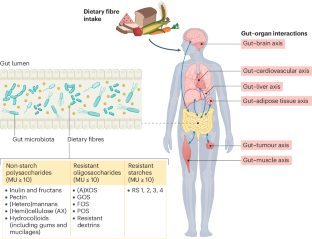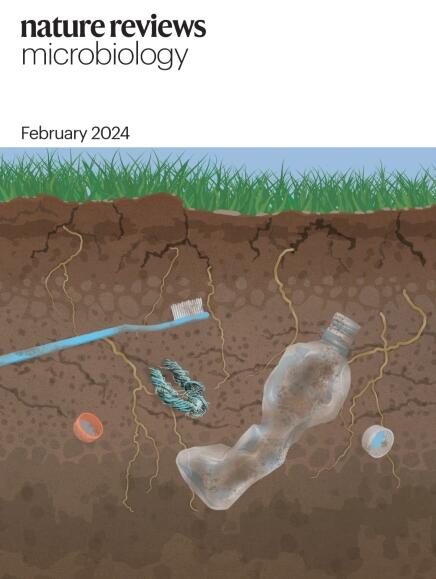肠道微生物组和膳食纤维:对肥胖、心脏代谢疾病和癌症的影响
IF 103.3
1区 生物学
Q1 MICROBIOLOGY
引用次数: 0
摘要
膳食纤维是各类营养素的重要组成部分,是预防各种慢性疾病的关键。大多数膳食纤维由肠道微生物群发酵,因此可能会调节肠道微生物生态和新陈代谢,从而影响人体健康。膳食纤维可能会影响特定细菌类群的发生,这种影响因人而异。膳食纤维对微生物多样性的影响还存在争议。大多数针对肥胖和相关代谢紊乱的膳食纤维干预研究表明,需要对微生物组进行准确评估,以更好地了解对膳食纤维的不同反应。流行病学研究证实,膳食纤维摄入量高与多种癌症发病率降低密切相关。然而,有必要确定特定膳食纤维干预对癌症风险、疗效和毒性以及癌症恶病质的影响。在这篇综述中,我们总结了肠道微生物组在肥胖、心血管代谢疾病和癌症(这些疾病的发病率明显与膳食纤维摄入量低有关)方面介导膳食纤维生理益处的机制。本文章由计算机程序翻译,如有差异,请以英文原文为准。


The gut microbiome and dietary fibres: implications in obesity, cardiometabolic diseases and cancer
Dietary fibres constitute a heterogeneous class of nutrients that are key in the prevention of various chronic diseases. Most dietary fibres are fermented by the gut microbiome and may, thereby, modulate the gut microbial ecology and metabolism, impacting human health. Dietary fibres may influence the occurrence of specific bacterial taxa, with this effect varying between individuals. The effect of dietary fibres on microbial diversity is a matter of debate. Most intervention studies with dietary fibres in the context of obesity and related metabolic disorders reveal the need for an accurate assessment of the microbiome to better understand the variable response to dietary fibres. Epidemiological studies confirm that a high dietary fibre intake is strongly associated with a reduced occurrence of many types of cancer. However, there is a need to determine the impact of intervention with specific dietary fibres on cancer risk, therapy efficacy and toxicity, as well as in cancer cachexia. In this Review, we summarize the mechanisms by which the gut microbiome can mediate the physiological benefits of dietary fibres in the contexts of obesity, cardiometabolic diseases and cancer, their incidence being clearly linked to low dietary fibre intake. In this Review, Delzenne et al. explore how dietary fibres interact with and modulate the gut microbiota, and discuss their effects on human physiology, particularly in the context of obesity, cardiometabolic diseases and cancer.
求助全文
通过发布文献求助,成功后即可免费获取论文全文。
去求助
来源期刊

Nature Reviews Microbiology
生物-微生物学
CiteScore
74.00
自引率
0.50%
发文量
149
审稿时长
6-12 weeks
期刊介绍:
At Nature Reviews Microbiology, our goal is to become the leading source of reviews and commentaries for the scientific community we cater to. We are dedicated to publishing articles that are not only authoritative but also easily accessible, supplementing them with clear and concise figures, tables, and other visual aids. Our objective is to offer an unparalleled service to authors, referees, and readers, and we continuously strive to maximize the usefulness and impact of each article we publish. With a focus on Reviews, Perspectives, and Comments spanning the entire field of microbiology, our wide scope ensures that the work we feature reaches the widest possible audience.
 求助内容:
求助内容: 应助结果提醒方式:
应助结果提醒方式:


